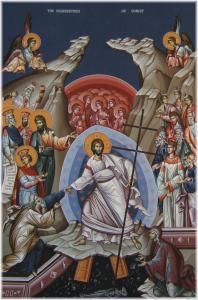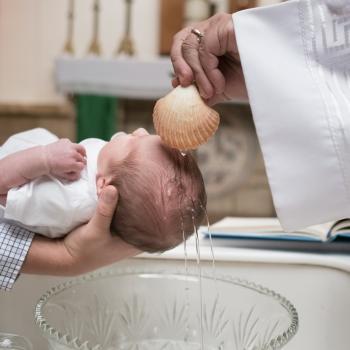“I believe in the resurrection of the body, and the life everlasting.” (Nicene Creed)
I cannot argue that I have suffered more loss than others.
Yes, I have lost both of my parents, my brother, and some of my closest friends. I have been through unemployment – twice – and I have spent my fair share of time in the hospital. Enough of those trips involved broken bones that my brother, who was an orthopedic surgeon, once described me as “an annuity”.
But most of the challenges that I have faced could be classified as “first world problems”. They cannot be compared with those who live in war zones, with those who grapple daily with life-threatening disease or handicaps, or with those who wonder today whether they will be here tomorrow.
But I do pay attention to life’s pain and frayed places. And paying attention has convinced me of this: The joy of Christ’s Resurrection is a fraud if it does not speak to us when life is hard.
It is important, then, not to confuse the joy of the Resurrection with happiness, optimism or escape.
Happiness is about finding a constant high. It’s about riding the crest of a wave. It is nurtured by security and it knows nothing about life’s hard places. A pastor who lives in a 10,000 square foot home and jets around the country in a private plane, promising that God will make you healthy, wealthy, and wise is not preaching the joy of the Resurrection.
Optimism is about playing the long odds. About hoping that circumstances are different or will improve. Optimism talks about the arc of history, about things that don’t or can’t happen anymore, about legislation that will change things forever. It knows nothing about the loss of life, young and old – about wars that look just like the old ones – about school shootings – or lifelong illnesses.
Escape is a get out of jail free card. It is about denial and Woody Allen: “I’m not afraid of dying, I just don’t want to be there when it happens.
The joy of Easter is something else, entirely.
It is about God in human flesh. About a God who voluntarily sides with us. A God who sheds heaven and steps into our skin.
Resurrection joy is about a God who experiences the fear of death, and who suffers the torture and degradation served up by the world class power of his day.
He is betrayed and abandoned by his own. He is prosecuted with the connivance of religious leaders. And when he is dead, the tomb is closed up. And his mother and followers go to their homes — just like the friends and families of everyone who dies.
What happens next is not what anyone expected. In human experience the Resurrection is not something that follows death. It doesn’t make sense. It is not a sequel. It is a reversal.
Resurrection joy, then, is not about happiness and riding the crest of the wave. It is not about optimism and banking on things getting better. It is not about escape and a get out of jail free card.
It is about a way through misery. It is about conquest. It is about breaking the power of death by experiencing it. And it is there – in the middle of darkness, betrayal, abandonment, and loss – that we discover the nature of Christian joy.
Christians acknowledge the broken nature of human life. They grieve because they love. They experience loss because they believe life is the good gift of God.
They look death and loss straight in the face. They don’t candy-coat it. They don’t call death “all a part of the process”. They don’t shrug off just how ugly life and human beings can be. They march straight back into life with all of its perils because they follow a Savior who has broken the power of death but who recruits his followers to continue the battle against its impact – loving others, working for justice, grieving along side those who grieve, binding up wounds, offering hope.
Let me tell you three things about that kind of joy and peace that the Resurrection brings with it.
One: It doesn’t take any more faith than any other big picture explanation for the meaning and purpose of life.
This morning you may be thinking to yourself, “Not me, I don’t live by faith. I depend upon the science.”
You might think that you do. And science is an impressive descriptive tool.
But while it can tell us how some things work, there is more that it doesn’t know. And it can’t explain why the physical universe exists at all. The big bang theory, for example, is a great account of how the world came to be, and it was first formulated by a Catholic monk, by the way. But it can’t account for why the most basic elements of that big bang existed at all.
The scientific method is, in fact, an open-ended process that shouldn’t even be attached to a definite article. The science of Middle Ages offered bleedings and leeches. The science of the 1960s drew targets on your chest and irradiated soft tissue without discriminating between cells that were healthy and those that weren’t. More recent efforts involving chemotherapy still poison the whole body in the hope of eliminating tumors.
So, when we say to ourselves, “I believe the science, we should acknowledge that there is no such thing and that it takes a good of deal of faith to suggest that what is – by definition – an endless, open inquiry into physical processes can offer meaning or purpose.
But you might not be one of those people. You might be one those people who says to themselves, “I believe in the power of politics.”
Bless your heart. You have my sympathy. You need even more faith.
The human race has, for millennia, experimented with every conceivable form of government, and with each change it has made increasingly extravagant promises. I can almost hear the king of Babylonia promising to “build Babylonia back better” and the king of Sumer and Akkad offering to “make Assyria great again”. And, to be sure, human governance is a wonderful thing. True leaders are a gift.
But none of them has ever delivered on what matters most to us as human beings: connection, purpose, and meaning. And the defense, “this form of government has never really been tried” is probably what they said at the Tower of Babel.
In addition, human beings are broken. They lie, cheat, steal, murder, and commit all sorts of sins. How we can imagine building perfection out of that is, frankly, hard to imagine. Our own system of checks and balances, which has been strained to the point of breaking, is not a system for insuring perfection but for preventing abuse.
So, when we Christians talk about faith in the Resurrection, we are not making an outrageous claim. We are witnessing to faith in a conviction that is inescapable: If there is any hope of healing, life, and well-being, it has to lie in one who is beyond us and who subverts the power of death in all its forms, small and large, transitory and final.
A second thing I would note about the joy of the Resurrection is that it cannot be seized, grasped, or earned.
It is God’s work and God’s gift. And the joy that arises from the promise of the Resurrection is a life free of the weight of our mistakes and the burden of doubts about our worthiness.
There is a little-known story that was deleted from the Gospel about a man named Jim Abraham, who – upon arriving in heaven – was asked by the gatekeeper, “What are you doing here? You are criminal.”
Jim looked at him and said. “You are right. I can’t offer a case for being here. I was invited by the guy on the cross next to me.”
All that to say: If the creation of enduring joy lies beyond it. Then finding it does as well.
As a first child and perfectionist, I can honestly say, this may sound like bad news, but it is very good news indeed. There is nothing wrong with effort and achievement. It is the engine of endless good and the best of it is other-directed and dedicated to lifting-up others.
But, as you have heard me say countless times, “There is a God, and we are not.” So, there is time and a place to lay down our efforts and surrender to God’s effort on our behalf. You may not think that you are there yet. It is particularly common for men to live in denial about this fact – burying it in bravado. But there is a lot of truth in the meme that I saw some months ago, featuring an old man who – staring straight in the eyes of his audience – declares, “You young guys go ahead and push it but one of these days that check engine light is going to come on.”
Finally, Resurrection joy is the kind of joy that can’t be destroyed.
I said at the outset that I try to pay attention to life’s hard places. And I am now old enough to have been in a few.
What has become clear to me over the years is that there is no person, no moment, no place that we can hold onto. The passage of time – if nothing else – makes that obvious.
There are no hearses with luggage racks. There are no moments that last indefinitely. People age, change, move away, and die. Even the institutions that we build as monuments to our hopes and aspirations fade and die away. Loving others as much as we can, there is no escaping loss. There is no preserving the best of the moments.
This is not to say we should not make the effort. It is not to say that we should not try.
But that effort only makes sense if somewhere what matters and is lost is kept safe. And the inevitable change that sweeps away aspirations, love, and memories makes that impossible – with one, notable exception: the Resurrection.
You see, the Resurrection is not important to the Christian faith because it offers pie in the sky, bye and bye. The Resurrrection isn’t important because it promises that beyond the grave, will be present to one another again and forever, though it does.
It is important because the joy of the Resurrection lies in the promise that God in Jesus Christ is, indeed, the author of life and because – in the Resurrection – God has broken the power of death. It is impossible to know what that will look like, but as Christians, we are convinced that everything that is good and that matters will be restored to us.
May Christ embrace you this day and always in the power of the Resurrection. And may you know and experience its joy.













